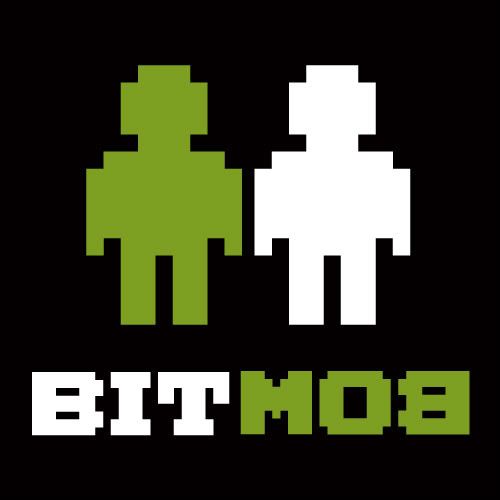
I ran into Bitmob co-founder Dan "Shoe" at E3 this year and began telling him a story. He put me on hold until we could grab the attention of his business partner, Demian Linn, who was at the same after-hours function, such that I could tell both of them simultaneously. Shoe then asked me if I would tell said story to all of you here on Bitmob.
So here I am, to say that I never would have broken into games journalism without Bitmob. I’m incredibly grateful for this site and hope that everyone appreciates how special this place is.
Writing for an audience is everything. When many of us start writing, we create our own, private blogs as repositories for our work. But unless the content is amazingly original, extremely well-written, and has some sort of hook to draw people in, I don't think said blogs will get us anywhere if we want to break into writing professionally, which was my goal back in February of 2010.
When I discovered Bitmob two months later in April, I knew I’d found something important. The site came with a built-in audience, and all anyone had to do was reach out and try to grab a portion of it for themselves.
Knowing that people will be reading the work hopefully inspires writers to up their game. Bitmob also encourages a spirit of healthy competition — to get front-page space. That latter part is important because it reflects the reality of freelance writing. Unless you have a staff job or a recurring gig like a column, other writers are pitching to the same space you’re trying to land and ready to take up the real estate.
Getting promoted to Bitmob’s front page was not only a confidence-booster when I was first starting out, but it also provided valuable learning experience about structure, pacing, and keeping copy tight. The writer-editor relationship is extremely valuable. Even if you don’t actually have a back-and-forth with a Bitmob editor, you’re getting a taste of what it is to see other people lend their perspective on your work if your pieces get promoted to the front page, and hopefully your work is made better for it.
Reviewing promoted pieces on Bitmob's home page to see where the changes were made, and thinking about why those changes might have been made, helped me get my writing in shape much faster than I would have otherwise. I realize that not every community writer on Bitmob wants to go pro but many do, and my point is that Bitmob can serve as an effective proving ground.
Not too long ago, a very well-known editor-in-chief in the business said to a bunch of our colleagues that if you wanted to write about games nowadays, you were screwed. If they needed something written, they had a folder full of names of freelance journos with published clips who they could turn to.
What others said in response was that if you can write features, you can always find work. Freelancers need to pitch those features, however, so it’s very easy to get stuck in a Moebius loop of needing to write features to get practice, pitching features to outlets, having those pitches rejected, and realizing that you need more practice writing features to develop better pitches.
 Bitmob gives people a place to take those features, and as a result, the site has played host to all sorts of interesting content that otherwise might never have seen the light of day. So much of what fills the pages of the video-game press includes news reports garnered from press releases, reblogged content from other outlets, previews, and reviews. Bitmob has such a refreshing, eclectic collection of regular feature content that it serves as a nice respite away from more traditional games-media coverage.
Bitmob gives people a place to take those features, and as a result, the site has played host to all sorts of interesting content that otherwise might never have seen the light of day. So much of what fills the pages of the video-game press includes news reports garnered from press releases, reblogged content from other outlets, previews, and reviews. Bitmob has such a refreshing, eclectic collection of regular feature content that it serves as a nice respite away from more traditional games-media coverage.
Bitmob also provides a break from the typical community that the games media seems to create. Commenters on gaming websites are notorious trolls. Perhaps the anonymity of the Internet makes voicing their venom safe when hiding behind a login name. Bitmob doesn’t roll that way. Everyone uses their real names, and I think it forces people to grow up a little bit and carry on their conversations in a reasonable fashion.
Perhaps the best example of that, for me, was the discussion of the Penny Arcade Dickwolves controversy we had on Bitmob. Go look at other games-journalism sites — the absolute top-dog, traffic-saturated outlets — and look at the quality of their conversations about the Dickwolves situation. Given, the more people you have, the more dingbats you have based on percentages, but there was none of that here on Bitmob. Our community defies convention that way, and it’s a very encouraging sight to see.
I don’t really have a conclusion for this, other than to thank Shoe and Demian for starting this website. Without it, I wouldn’t be doing all the professional writing I am now. It helped me gain confidence, it taught me how to write content that people wanted to read (and that editors were willing to pay for), and it gave me faith that video-games journalism could be of higher quality than so many of its readers seem to think is possible.
I regularly encourage writers who ask me for advice, or who I think could use the experience, to submit here to Bitmob by way of testing themselves, if they want to go into writing about games professionally. It’s one thing to get automatic page space on your personal blog. It's another thing altogether to stand up and submit your writing to be judged by a community which has no reason to be supportive other than because it likes what you're doing.
Writing on Bitmob makes a writer vulnerable, but I honestly believe it also makes them a better writer. It certainly did for me.
Dennis Scimeca is a freelancer from Boston, MA. He is a regular feature writer for G4TV, a contributing news reporter for Gamasutra, and his weekly column on Village Voice Media's Joystick Division, First Person, was picked up from right here on Bitmob. Dennis writes occasionally on his blog, Punching Snakes, and can be followed on Twitter: @DennisScimeca.
VentureBeat's mission is to be a digital town square for technical decision-makers to gain knowledge about transformative enterprise technology and transact. Learn More
